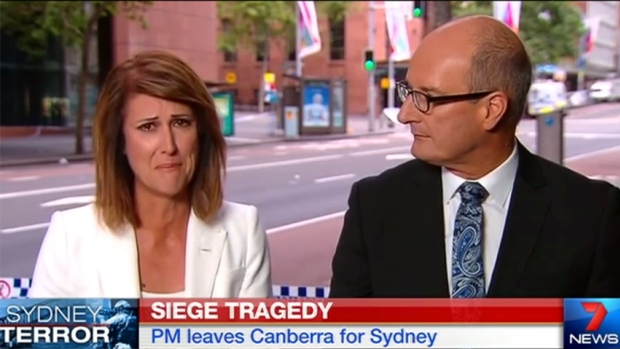The first image that I saw from the hostage crisis in Sydney was this:
My eye was immediately drawn to the lovely, young woman on the left, her eyes closed as if she could not bear to watch the nightmare she was now living. Softly, it seemed, as if growing faint with disbelief, she and another woman were forced to place the gunman’s sign up in the coffee shop window– just above a cheerful and familiar stencil of Merry Christmas— for the entire world to see. Something very different and beyond our comprehension was replacing the world we knew and loved, and it didn’t matter whether the white Arabic lettering on an ominous black background (making it look like some sort of pirate flag) was authentic ISIS or not, it felt like ISIS and that was sufficient.
To me, this photograph could only mean one thing, and that was that something beautiful and loved was going to be slaughtered before our eyes. Somebody’s perfect child, somebody who was falling in love and building a life, was about to die in the name of a politics few could truly understand. This young woman immediately became a stand-in for every high school girl I had ever known, every waitress or barista I had a secret crush on, in short, every glowing and ascendant person who made my day, or even just the idea of my day, a little brighter.
Halfway around the world in Pennsylvania, another tragedy, one much less publicized, but also containing a thread linking it back to the Middle East, was unfolding. Brad Stone, a marine who had been deployed in Iraq but was now walking with a cane and suffering PTS, was murdering his family. He killed 6 people and seriously wounded another before stabbing himself to death in the nearby woods.
Man Haron Monis, the deeply trouble Iranian-born refugee who caused so much havoc and fear in Sydney, appears to have been so completely deranged as to be almost divorced from politics, but whatever madness possessed him drew him to adopt radical and violent ideologies. Stone, who had fought in Iraq, returned damaged, beyond the nation’s capacity or willingness to salvage. Both of these men proved to be murderous examples of the collateral damage associated with whatever Orwellian title you want to give the ongoing conflicts (War on Terror, Clash of Civilization, Oil Wars) in the Middle East.
Such violent, tragic outbursts are not political statements against policy, but are the vivid, real life consequences of the policy. If a land is bombed and destroyed by an invading nation, both those that do the invading and those that suffer at their hands are damaged in irreparable and unimaginable ways—the experience poisons the soul. There is no winner in such a war, except for the economic machinery that profits from it. The rage, pain and loss of those on the ground can never be measured or contained, and will forever bleed back into the world, manifesting as a furious, sucking whirlpool of such force that everybody is affected.




Comments
One response to “Sydney-Penn”
Heartbreaking but beautifully stated, Michael.
Your voice speaks for many.